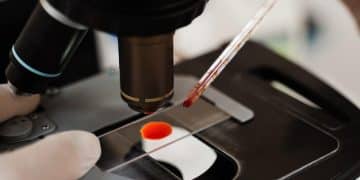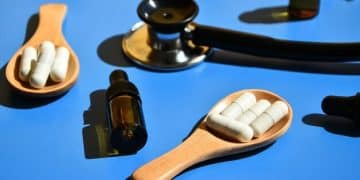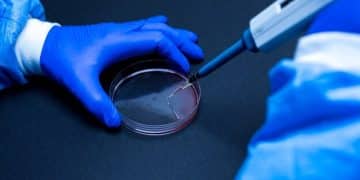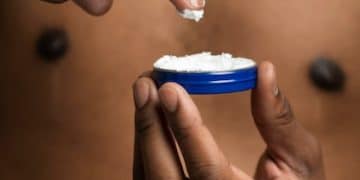Sleep Apnea and Testosterone: Understanding the Impact & Solutions
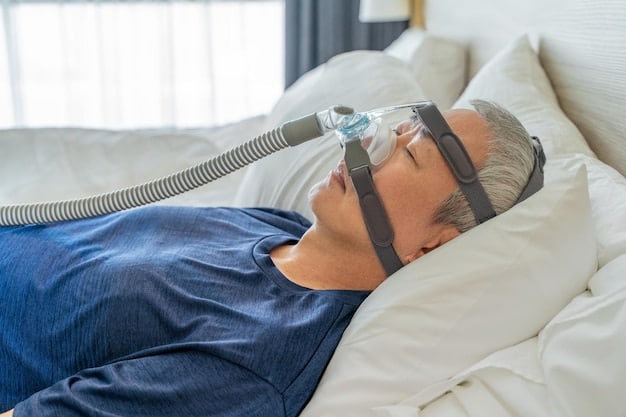
Sleep apnea significantly impacts testosterone levels in men, leading to various health issues; however, lifestyle changes and medical interventions can help manage this condition and restore hormonal balance.
Do you wake up feeling exhausted, even after a full night’s sleep? Are you experiencing a decrease in libido or struggling with fatigue? The culprit might be sleep apnea, a common disorder that can significantly impact your testosterone levels. Let’s explore the connection between sleep apnea on testosterone levels and what you can do about it.
Understanding Sleep Apnea
Sleep apnea is a sleep disorder characterized by pauses in breathing or shallow breaths during sleep. These interruptions can occur many times throughout the night, disrupting your sleep cycle and leading to a variety of health problems. Recognizing the different types and understanding their underlying causes is crucial for effective management.
Types of Sleep Apnea
There are three main types of sleep apnea, each with its own distinct characteristics and causes.
- Obstructive Sleep Apnea (OSA): The most common type, OSA occurs when the muscles in the throat relax, causing the airway to become blocked.
- Central Sleep Apnea (CSA): CSA is less common and involves the brain failing to send proper signals to the muscles that control breathing.
- Complex Sleep Apnea Syndrome: This syndrome is a combination of both obstructive and central sleep apnea.
Understanding the specific type of sleep apnea is essential as treatment approaches may vary.
Common Causes of Sleep Apnea
Several factors can contribute to the development of sleep apnea.
- Obesity: Excess weight can increase the risk of OSA due to fat deposits around the upper airway.
- Age: The risk of sleep apnea increases with age as muscle tone decreases.
- Genetics: A family history of sleep apnea can increase your likelihood of developing the condition.
Identifying these risk factors can help in preventative measures and early intervention.
Sleep apnea is not merely a sleep disturbance; it’s a condition with the potential for serious health repercussions. As we proceed, we will delve into how this disorder specifically affects testosterone levels, a crucial hormone for men’s health.
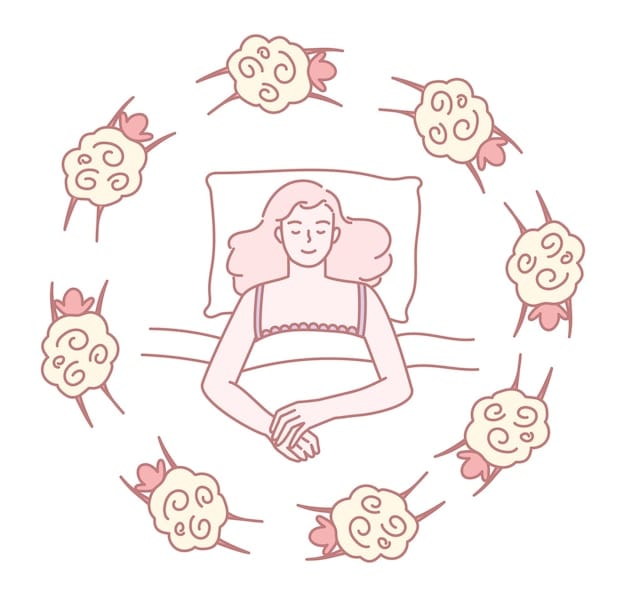
The Role of Testosterone in Men’s Health
Testosterone is a vital hormone in men, playing a crucial role in various physiological functions. Maintaining healthy testosterone levels is essential for overall well-being and quality of life. Understanding its diverse roles is key to appreciating the impact of sleep apnea on men’s health.
Key Functions of Testosterone
Testosterone contributes significantly to several crucial aspects of men’s health.
- Muscle Mass and Strength: Testosterone promotes muscle growth and helps maintain strength.
- Bone Density: It supports bone health, reducing the risk of osteoporosis.
- Libido and Sexual Function: Testosterone is essential for maintaining libido, erectile function, and sperm production.
These roles highlight the wide-ranging impact of testosterone on physical health.
Symptoms of Low Testosterone
When testosterone levels decline, men may experience a variety of symptoms.
- Fatigue: Persistent tiredness and low energy levels are common signs.
- Decreased Libido: A reduced interest in sex and erectile dysfunction can occur.
- Mood Changes: Irritability, depression, and difficulty concentrating may arise.
Recognizing these symptoms is the first step in seeking medical evaluation and appropriate treatment.
Testosterone’s influence extends far beyond physical attributes, impacting mood, energy levels, and overall vitality. Its connection to sleep apnea is an area of increasing concern, which we will explore in the next section.
The Link Between Sleep Apnea and Low Testosterone
The relationship between sleep apnea and low testosterone levels is complex and multifaceted. Studies have shown a significant correlation, indicating that sleep apnea can contribute to reduced testosterone production. Let’s delve into the mechanisms through which sleep apnea impacts this crucial hormone.
How Sleep Apnea Affects Testosterone Production
Sleep apnea can disrupt the normal hormonal balance in the body. The frequent awakenings and oxygen desaturation episodes can interfere with the production of testosterone.
During sleep, the body goes through different hormonal cycles. The occurrence of sleep apnea can disrupt the normal release of certain hormones. Specifically, instances of sleep apnea might actually hinder testosterone production. Research indicates that the fragmented sleep patterns and decreased oxygen levels trigger stress responses, leading to increased cortisol levels, which may inhibit testosterone synthesis.
Scientific Studies and Findings
Numerous studies have highlighted the association between sleep apnea and reduced testosterone levels.
- Research has shown that men with sleep apnea often have significantly lower testosterone levels compared to those without the condition.
- Studies have indicated that treating sleep apnea can lead to improvements in testosterone levels and associated symptoms.
These studies underscore the importance of addressing sleep apnea to maintain hormonal health.
The connection is clear: sleep apnea can significantly affect testosterone production, leading to a cascade of adverse health effects. Recognizing this link is essential for both diagnosis and treatment, which we will explore further.
Diagnosing Sleep Apnea and Testosterone Levels
Diagnosing sleep apnea and assessing testosterone levels are crucial steps in identifying and addressing the health issues arising from this interplay. Proper diagnosis involves a combination of sleep studies and hormone level assessments. Understanding the diagnostic process is essential for effective management.
Sleep Studies and Testing
The primary method for diagnosing sleep apnea is through a sleep study, also known as polysomnography.
A sleep study typically involves an overnight stay at a sleep center, where various parameters are monitored. This includes checking brain activity with an EEG, eye movements by using an EOG, and heart activity levels through an ECG. These checks ensure the correct diagnosis is reached.
The study measures:
- Brain Activity: To monitor sleep stages and detect awakenings.
- Breathing Patterns: To identify pauses in breathing or shallow breaths.
- Oxygen Levels: To assess oxygen desaturation episodes.
Assessing Testosterone Levels
Testosterone levels can be assessed through a simple blood test.
Measuring testosterone involves examining a person’s blood through multiple tests. This may also involve assessing other hormone levels to get a full overview. Doctors usually take a blood sample in the morning when testosterone levels are highest in the body. The blood sample is then sent to the lab so specialists can carry out the tests to determine the amount of testosterone present.
The test measures:
- Total Testosterone: Assessing the total amount of testosterone in the blood.
- Free Testosterone: Measuring the amount of testosterone that is not bound to proteins and is readily available for use by the body.

Accurate diagnosis is the cornerstone of effective treatment. By combining sleep studies with testosterone level assessments, healthcare professionals can develop a comprehensive plan tailored to the individual’s needs.
Treatment Options for Sleep Apnea and Low Testosterone
Addressing both sleep apnea and low testosterone often requires a multifaceted approach, combining lifestyle changes, medical interventions, and hormonal therapies. Tailoring the treatment plan to individual needs is essential for achieving optimal results. Let’s explore the available options.
Lifestyle Changes
Making certain lifestyle changes can significantly alleviate the symptoms of sleep apnea and improve testosterone levels.
Modifying one’s lifestyle is crucial for addressing the effects of sleep apnea and improving testosterone levels. Maintaining a balanced diet is key. It involves incorporating nutrient-rich foods that support hormonal function and overall health. Regular physical exercises will help keep weight under control and enhance cardiopulmonary function. Also, establishing a sleep routine is very important, it helps improve sleep quality.
Medical Interventions
Medical treatments, such as Continuous Positive Airway Pressure (CPAP) therapy, are often necessary to manage sleep apnea. Additionally, there are surgical options available for patients with severe sleep apnea.
Hormone Replacement Therapy (HRT)
In cases of significantly low testosterone, hormone replacement therapy (HRT) may be considered. HRT involves supplementing testosterone levels through various methods, such as injections, patches, or gels.
When treating low testosterone levels, health specialists may suggest Hormone Replacement Therapy, also known as HRT. This therapy is prescribed and professionally administered to replace or enhance testosterone levels within you. This particular treatment comes in numerous ways, including creams, patches, injections, and gels. Always seek advice from a medical expert and perform consistent monitoring through the therapy.
Treating sleep apnea and low testosterone requires a comprehensive approach. By combining lifestyle modifications, medical interventions, and hormonal therapies, men can improve their overall health and quality of life. The decision to pursue any treatment should be made in consultation with a healthcare professional.
Lifestyle Changes to Improve Sleep Apnea and Boost Testosterone
Adopting specific lifestyle changes can play a significant role in managing sleep apnea and improving testosterone levels. Integrating these changes into your daily routine can lead to substantial improvements in overall health. Let’s explore some practical strategies.
Diet and Exercise
A healthy diet and regular exercise are fundamental to managing sleep apnea and boosting testosterone.
Maintaining a well-balanced diet and engaging in regular exercise are paramount for effectively managing sleep apnea and enhancing testosterone levels. Focus on eating healthy meals that combine fruits, vegetables, whole grains, and lean meats, reducing processes food that could trigger weight gain. Furthermore, consistent exercise keeps the metabolism in good shape and boosts general health. The Centers for Disease Control and Prevention (CDC) recommends at least 150 minutes of average-intensity exercise or 75 mins of high-intensity activity per week.
Sleep Hygiene Practices
The practice of good sleep hygiene is vital for dealing with sleep apnea. Improving sleep habits will improve overall sleep quality which will in turn help sleep apnea.
Enhancing sleep habits is paramount for supporting the management of sleep apnea and optimizing testosterone production.
- Establish a Consistent Sleep Schedule: Go to bed and wake up at the same time every day, even on weekends, to regulate your body’s natural sleep-wake cycle.
- Create a Relaxing Bedtime Routine: Engage in calming activities such as reading, meditation, or light stretching to unwind before bed.
- Optimize Your Sleep Environment: Ensure your bedroom is dark, quiet, and cool to promote restful sleep.
Weight Management
Excess weight, particularly around the neck, can worsen sleep apnea and lower testosterone levels. Weight management through diet and exercise can significantly improve these conditions.
Losing any weight and maintaining a generally healthy weight helps in managing sleep apnea and also optimizing hormonal balance. Studies indicate that an excess of adipose tissue, specifically round the neck, is typically linked to severe obstruction in the upper airways. As such, those with high body mass indexes (BMIs) are much more likely to develop sleep apnea.
| Key Point | Brief Description |
|---|---|
| 😴 Sleep Apnea | Causes pauses in breathing, disrupting sleep. |
| 💪 Testosterone | Essential for muscle mass, bone density, and libido in men. |
| 📉 Impact | Sleep apnea can lower testosterone levels. |
| ✅ Solutions | Lifestyle changes, CPAP therapy, and HRT can help. |
Frequently Asked Questions (FAQ)
▼
Yes, sleep apnea can disrupt the normal hormonal balance, affecting testosterone production. The frequent awakenings and oxygen desaturation episodes can lead to reduced testosterone levels.
▼
Common symptoms include loud snoring, daytime fatigue, and pauses in breathing during sleep. The best way to confirm is through a sleep study conducted at a sleep center or at home.
▼
Treatment options include lifestyle changes, CPAP therapy, oral appliances, and, in some cases, surgery. The most appropriate treatment depends on the severity and cause of the sleep apnea.
▼
Yes, losing weight can significantly improve sleep apnea symptoms and boost testosterone levels, especially if excess weight is a contributing factor to both conditions.
▼
HRT can be effective, but it’s essential to discuss the potential risks and benefits with a healthcare provider. Regular monitoring is crucial to ensure safety and efficacy.
Conclusion
The interplay between sleep apnea and testosterone levels is significant, impacting men’s health in numerous ways. By understanding the connection, seeking timely diagnosis, and adopting appropriate treatments and lifestyle changes, you can effectively manage these conditions and improve your overall well-being. Consult with healthcare professionals to create a personalized plan that addresses your specific needs.

